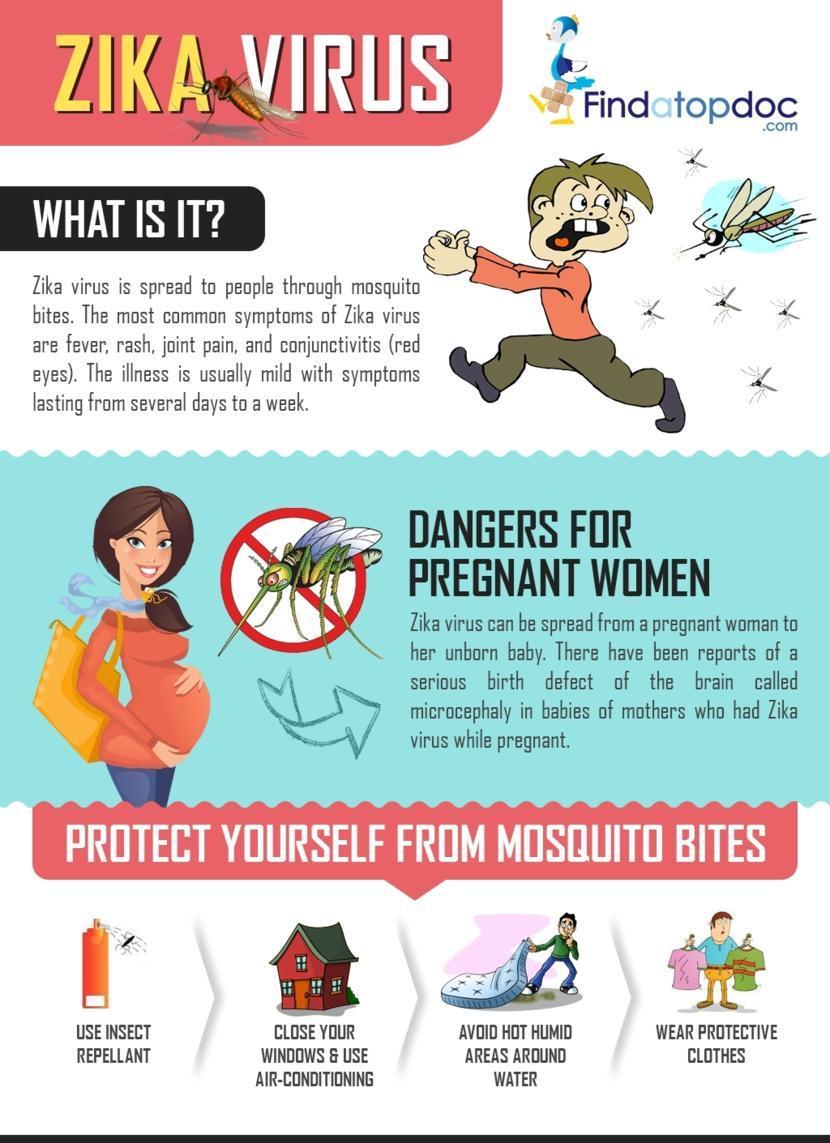Everything You Need to Know About the Zika Virus
What it is, where it is, and how it can affect you.

What is Zika virus?
Zika virus (Flavivirus) isn`t a new virus, initially, it was found in Uganda and called after the place where the virus was first detected- Zika forest (1947). It is a mosquito-borne virus, which is transmitted from a particular species of infected insects (Aedes), the aggressive day biters. The virus develops in the mosquito`s body very fast in such conditions as hot and humid tropical climate, slums, near standing water. Very frequently Zika infection goes with no symptoms, so the infected ones don`t even know that they have it.
What are the ways of transmission?
You can`t catch the virus, standing near an infected person, it does not pass through the air. The mosquitoes feed on the infected people and become infected themselves accordingly. Zika virus is transmitted through the bites, causing Zika virus disease, dengue, chikungunya and yellow fever. During the first week of illness infected persons are the most contagious.
The ways of transmission:
- Bites of the mosquitoes.
- From mother to child (during a pregnancy or a delivery, but not while the breastfeeding)
- Unprotected sexual contact (it`s claimed that the virus stays longer in the men`s semen than in the blood).
- Blood transfusion from an infected donor.
What are the symptoms?
Zika virus mimics any other mild viral infections (flu) lasting for approximately a week after being bitten by the infected mosquito. The manifestation of this virus infection is followed by:
- fever
- joint pain
- conjunctivitis ( itchy red watery eyes with specific discharges from the inner corner of the eyes, sometimes with puss)
- rash
- slight general fatigue
The complications of the Zika virus infection:
The saddest fact is that Zika virus is especially dangerous to the developing fetus when you are pregnant; it can affect the brain of the baby at any trimester of your pregnancy leading to the condition which is known as a microcephaly (“small head”, the brain does not develop properly resulting in a smaller than usual head), calcification of the brain tissue (deposits of calcium in the brain) and other malformations (inborn defects). Further this disorders cause retardation of the mental and physical development of such children (lack of thriving, seizures and edema (swelling) of the brain, in severe cases even death). If you`re expecting (pregnant) or planning to conceive (get pregnant), you are advised to avoid Zika infected areas.
Zika`s map:
In 1952, the first case of the disease in humans was detected and since that time, it has spread widely in the countries with a humid and wet climate namely Africa, Southeast Asia, and the Pacific Islands. However the disease spreads beyond the boundaries of the mosquito`s natural habitat due to the climate changes and the weather conditions.
The countries listed below are the ones where the potential danger of being infected is (according to the data about the epidemics of Zika virus in 2015-2016)
- American Samoa
- Aruba
- Barbados
- Belize
- Bolivia
- Bonaire
- Brazil
- Cape Verde
- Colombia
- Commonwealth of Puerto Rico, U.S. territory
- Costa Rica
- Cuba
- Curacao
- Dominica
- Dominican Republic
- Ecuador
- El Salvador
- Fiji
- French Guiana
- Guadeloupe
- Guatemala
- Guyana
- Haiti
- Honduras
- Jamaica
- Kosrae
- Marshall Islands
- Martinique
- Mexico
- New Caledonia
- Nicaragua
- Panama
- Paraguay
- Saint Lucia
- Saint Martin
- Saint Vincent and the Grenadines
- Samoa
- Sint Maarten
- Suriname
- Tonga
- Trinidad and Tobago
- U.S. Virgin Islands
- Venezuela
The treatment for Zika virus infection:
- Load your body with plenty of fluids (tea, mineral water, fresh juice etc.)
- Rest and avoid physical exercises.
- In case of fever, take Tylenol.
- Do not take non-steroidal anti-inflammatory drugs (NSAIDS) or aspirin, as they can make you bleed (the blood gets very thin while Zika infections, such as dengue, yellow fever.)
Is there any vaccination for Zika virus?
Unfortunately, there is no vaccination for Zika virus yet but it is expected that we should have a vaccination publicly available within 2 years. For now follow the below tips to mitigate your chances of contracting Zika.
- Avoid mosquito bites, try to wear long sleeves clothes in order to cover your skin surfaces as much as it`s possible.
- Protect your accommodation from the mosquitoes (screens, insect repellents, etc just to keep the mosquitoes outside)
- Always use condoms (from the beginning of the sexual intercourse to the end).
- Always check the list of the countries affected with Zika virus, before setting off (travel health notices).
- The travelers from the Zika areas have to protect themselves from the mosquito bites in order to prevent the spread of the virus to other residents for the next three weeks upon their arrival to the US.
















